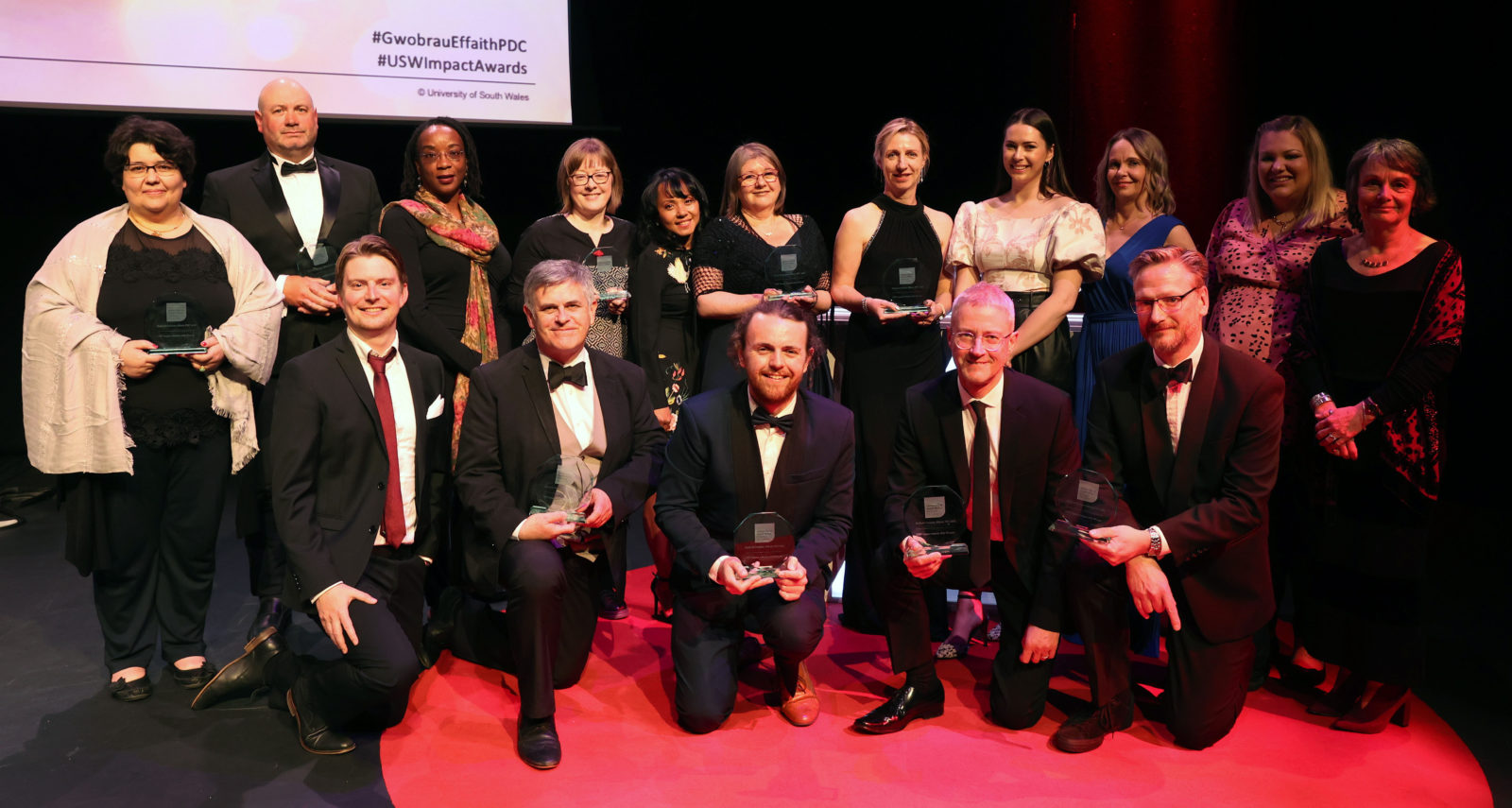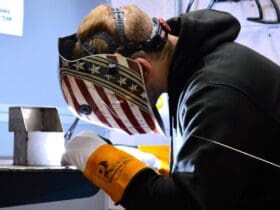The University of South Wales (USW) held its annual Impact & Innovation Awards this week (Wednesday), in celebration of research that makes an impact on the community and wider society in Wales, nationally and internationally.
The fourth annual awards saw Pro Vice-Chancellor for Innovation & Engagement, Professor Paul Harrison, welcome more than 120 guests, including shortlisted nominees and their collaborative partners.
This year, 26 entries were received from a wide spectrum of disciplines and from researchers at different stages of their careers. The shortlisted projects address some of the most significant challenges facing society today, from promoting community cohesion to tackling climate change and from promoting equality to improving access to healthcare for all.
Prof Paul Harrison said: “We aim to make a difference in the real world, changing lives and our world for the better. The diversity of these projects is testament to the space the University of South Wales occupies as a professionally focused, business and community engaged university.
“By placing partnership and collaboration at the heart of everything we do, we can improve the success of our region and nation by supporting economic growth. Our knowledge exchange alone contributes over £25 million to the UK economy and supports more than 370 jobs.”
Awards were presented in eight categories, each presented by special guests of USW. The winners were:
Impact on Creative Industries
Professor Lisa Lewis: Facilitating cultural awareness between Wales and the Khasi community
The cultural links between the Welsh and the Khasi people of North East India have been revived through innovative research by USW’s Centre for Media and Culture in Small Nations. They have increased awareness and understanding amongst communities in both India and Wales of the history of the Welsh-Khasi cultural exchange through using a variety or arts practice. This is also a model of international cultural collaboration and demonstrates how artistic practice can help communities come to terms with their complex and hidden histories.
Environmental Impact
Jon Maddy: Using hydrogen technologies to decarbonise industry, transport and energy
Research by USW’s Hydrogen Centre focuses on the application of hydrogen technologies to achieve deep decarbonisation of industry, transport and the energy sector. The research has influenced the development of UK and Welsh Government policy on hydrogen and accelerated industrial engagement in decarbonisation, particularly through the development of novel techniques to recover hydrogen from steel making, and the formation and development of an extensive South Wales Industrial Cluster (SWIC) with more than 40 industrial partners from several sectors.
Impact on Crime, Justice and Security
Clare Johnson: Working with industry to engage young people in cyber security in Wales
The National Digital Exploitation Centre (NDEC) is a collaborative project between Thales, Welsh Government and USW. USW leads on the NDEC’s education and outreach project which aims to address skills requirements and the need for improved diversity in the cyber security sector. The project has a particular focus on getting more girls into the industry, increasing cultural diversity, and inspiring young people from more deprived areas of Wales.
Impact on Health & Wellbeing
Dr Roiyah Saltus: Improving BAME mental health and social care in Wales
Collaborative research by USW and Diverse Cymru has underpinned the Cultural Competence Certification Scheme, the first of its kind in the UK and Europe, which aims to make the BAME community in Wales more comfortable when accessing mental health services, and for health care practitioners and professionals to be more sensitive and knowledgeable about the issues that the BAME community may face in obtaining mental health services and support.
Business Innovation
Dr Morgan Williams: Reducing the impact of hamstring injury in sports professionals
Research conducted by an international collaboration founded by Dr Morgan Williams, USW; Dr Anthony Shield, Queensland University of Technology, and Dr David Opar, Australian Catholic University, Melbourne has been used to improve the conditioning, monitoring and screening of sports professionals for hamstring strain injury risk. The research has enabled sports organisations worldwide to improve their performance practice to reduce injury occurrence and speed up recovery times of players.
Student Innovation & Enterprise
Alan McKay: Assisting football coaches to develop resilience in young players
USW’s research has changed the Football Association of Wales Trust (FAWT) understanding of how they can support young Welsh international elite players and made a significant contribution towards the FAWT identifying and developing the next generation of youth players to support the future success of the Welsh National team and create a world class coach education programme.
Impact on Public Policy and Practice
Joint winners – Prof Sandra Esteves: Industrialising anaerobic digestion to recycle waste; and Gareth Roderique-Davies & Prof Bev John: Informing awareness, diagnosis and treatment of alcohol related brain damage (ARBD)
The Wales Centre of Excellence for Anaerobic Digestion at USW has carried out critical research which led to policy changes and the development of new bio-waste treatment policy for Wales, the UK, Europe and internationally.
Alcohol Related Brain Damage (ARBD) is an under-diagnosed but treatable condition associated with debilitating cognitive and physical deficits. Work by the Addictions Research Group has increased awareness of ARBD nationally and internationally, and informed regional and national government policy and professional practice.
Civic Impact
Prof Chris Evans – Understanding the links between Wales and the Atlantic slave trade
Work by USW historian Chris Evans to understand the suppressed history of the Welsh textiles industries and their supply of fabrics to the Atlantic slave trade is affecting the ways in which public bodies and creative artists handle a difficult, contested past.








Leave a Reply
View Comments